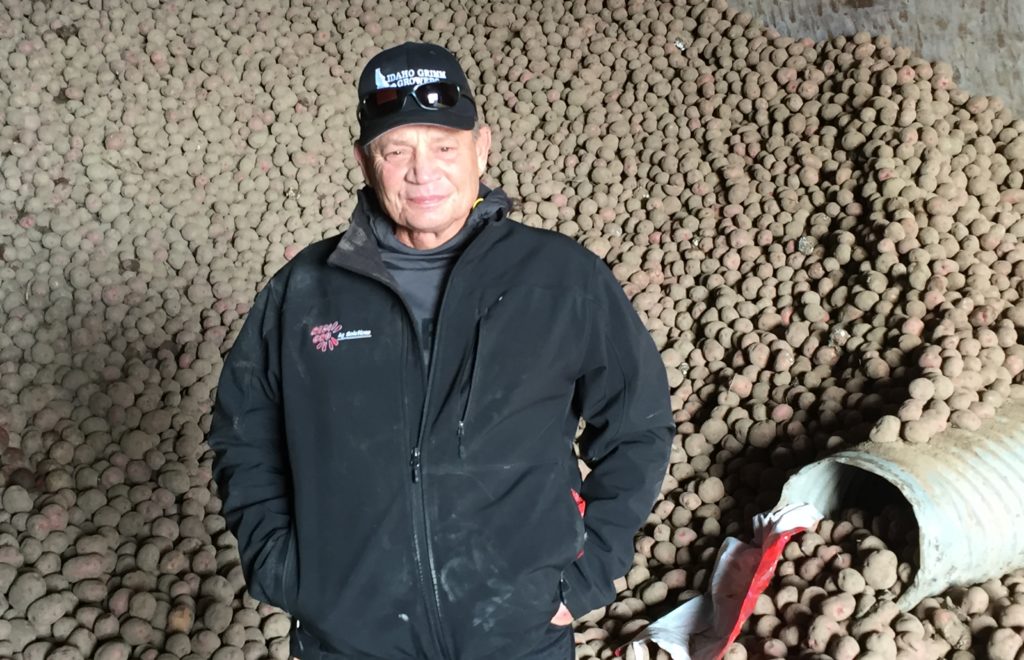
New McCain contracts worry some growers
Idaho farmers who raise potatoes for making frozen fries fear a contract being offered by a Canadian food manufacturer could quash their chances of earning better profits in 2018 and 2019.
Chuck Stadick, executive director of Southern Idaho Potato Cooperative (SIPCO), which represents Idaho growers in negotiations with potato processors, said McCain Foods circumvented the grower organization this fall and went straight to farms with an “unfair” contract.
Stadick said dialogue with the other major processors – Lamb Weston and J.R. Simplot – had been going well but stalled once the industry learned of McCain’s offer.
Growers who signed the McCain contract say they’ve been prohibited from divulging details by a nondisclosure agreement.
“The processor told the grower what the contract agreement would be relative to volume but did not communicate anything about price until the grower signed a nondisclosure agreement,” Stadick said. “The processor told growers they have acreage volume available, and if they didn’t sign the (agreement), they would go to another grower, and the first grower would lose the acreage volume.”
Growers and processors typically renegotiate their contracts annually. Sources have told SIPCO McCain’s contract would cover the next two seasons, locking prices paid to growers in at 2017 values, which Stadick contends were already depressed. Stadick said McCain has reserved the right to reduce contract prices if competing processors secure lower rates, but the prices won’t go up if the competition pays more.
Roughly 45 percent of Idaho’s potato crop is processed into frozen fries. SIPCO board member Klaren Koompin, an American Falls grower who raises about 3,000 acres of spuds per year for Lamb Weston and Simplot, had been expecting at least a 4 percent raise in next season’s contract. Koompin estimates he’ll lose $500,000 if he’s ultimately offered a flat contract in lieu of the anticipated increase.
McCain officials told SIPCO their change in approach to contracting is necessary to ensure an adequate potato supply for a $200 million expansion of their Burley plant, announced on May 3.
A McCain spokeswoman issued a brief statement after reviewing details of this story: “McCain values our partnerships with our Idaho growers. Many of these relationships have been in place for decades. We are pleased that the McCain Idaho growers are supportive of our expansion in Burley, and of the Idaho potato industry.”
Stadick insists SIPCO would have guaranteed McCain the necessary volume and negotiated consistent contract prices for all of the processors in the spring.
Stadick learned of McCain’s contract in late November, from a few growers who refused to sign the non-disclosure agreement. He called McCain’s director of raw procurement for the Burley plant a few days later for confirmation.
“I said, ‘I’m going into my board meeting. Is there anything I need to tell my board about McCain’s negotiations for a contract in the coming year?’” Stadick said. “He said, ‘We’re not going to be negotiating with you.’”
Stadick believes potato production costs, including chemicals and land rental rates, will continue rising. He emphasized processors have been requiring growers to bear added costs without extra compensation to comply with an audit, called the Potato Sustainability Initiative, demonstrating their farms use sustainable production methods.
In addition to negotiating fair returns for growers, Stadick explained SIPCO also “keeps a level playing field” for the processors, making certain their contract costs are within pennies. He said processors who bypass SIPCO won’t have the benefit of knowing what their competition is paying for spuds.
SIPCO President Mark Darrington, who farms in Declo, recently resigned from his leadership position due to a perceived conflict of interest, having signed the nondisclosure agreement and contract with McCain. He’s been replaced by Aberdeen farmer Marc Foster.
University of Idaho Extension economist Ben Eborn tracks average production costs of Idaho’s potato farms, and he concurs with Stadick’s general farm-input predictions.
“I’m still working on the 2017 report, but overall, it looks like production costs are going up,” Eborn said.
Looking to 2018, Eborn anticipates fertilizer and chemical costs will be up slightly from 2017, irrigation costs will rise 2 to 5 percent, costs of fuel and repairs will rise 3 to 10 percent, labor will rise 3 percent and interest will rise 0.5 to 1 percent.
“Unilateral contracts help guarantee farmers will overproduce and lose their market leverage,” Eborn said.
Former SIPCO board member Ritchey Toevs of Aberdeen said SIPCO plans to meet with the other processors to determine how to move forward, but anticipates “it’s going to affect the relationship with everybody.”
Koompin said contract prices paid by the major processors have already dropped 7 to 8 percent during the past three years. He’s taken 450 acres of his least productive ground out of potato production during the past two years, based on the gradual erosion of his contract prices.
“If we’re trying to stay sustainable, we’re forgetting one big thing. You’ve got to make a little money to be able to do that,” Koompin said.
Koompin anticipates McCain’s contract will lead to greater reductions in Idaho potato acreage, longer rotations between potato crops and a more rapid pace of farm consolidations.
“The margins are so thin on these potatoes, it’s not worth the effort to keep doing it,” Koompin said.
Efforts to reach representatives for Simplot and Lamb Weston were unsuccessful.














